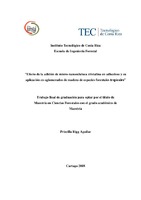Efecto de la adición de micro-nanocelulosa cristalina en adhesivos y su aplicación en aglomerados de madera de especies forestales tropicales
Resumen
The aim of this study was to characterize micro-nanocellulose (MNC) extracted from pineapple stem by acid hydrolysis. The MNC was tested in two concentrations, 0,5% and 1,0% in two wood adhesives: polyvinyl acetate (PVAc) and urea formaldehyde (UF). The pure MNC and the adhesives with MNC were characterized by Thermogravimetric Analysis (TGA), Fourier Transform Infrared Spectroscopy (FTIR), Scanning Electron Microscopy (SEM), Transmission Electron Microscopy (TEM), Atomic Force Microscopy (AFM) and viscosity. TGA showed three different decomposition processes from pure MNC: between 169-252 °C, between 199-282 °C and between 37-693 °C. The FTIR analysis showed the presence of characteristic signals related to cellulose. SEM reveals cellulose fibers presented 4–20 μm in diameter and 200 nm lengths. TEM and AFM images evidenced fibers with diameters between 2-30 nm and 200 nm lengths. When MNC is added to the adhesives, there is an increment in thermal stability in the adhesive PVAc with 0.5% of MNC and in adhesive UF with 1.0% of MNC. FTIR showed signals from MNC in the adhesives, besides the TEM images show a good distribution of MNC inside the adhesive. The viscosity decreases in adhesive PVAc from 40 to 15 Pa s and there is also a decrease in adhesive UF from 35 to 20 Pas at the initial point.
Descripción
Proyecto de Graduación (Maestría en Ciencias Forestales) Instituto Tecnológico de Costa Rica, Escuela de Ingeniería Forestal, 2018.


